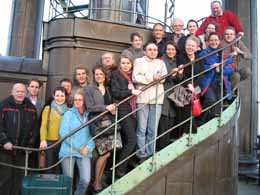The BaltSeaPlan (BSP)


The BaltSeaPlan (BSP) main objective is to develop, introduce and implement Maritime Spatial Planning throughout the Baltic Sea Region in a coherent manner.
The 3.7 m EUR project BaltSeaPlan (2009 – 2012) is one the major EU initiatives in the field of Maritime Spatial Planning (MSP) in the coming years. With 14 partners from 7 Baltic countries, the project will provide key input into the realization of the EU Maritime Policy, HELCOM Baltic Sea Action Plan and the VASAB Gdańsk Declaration.
The Baltic Sea is a unique inland sea. It is a dynamic economic area and at the same time characterised by special geographic and environmental conditions. The different sea uses, such as shipping, fishery, wind farms or mineral extraction are increasingly competing for the limited sea space. On top of this, the fragile Baltic ecosystem and the threats of climate change call for a balanced multi-sectoral approach. A wise, pro-active MSP could not only avoid conflicts, but also create welcome synergies and thus lay a basis for a sustainable maritime development.
Seven important Baltic areas were chosen for pilot MSPs, among them the Pomeranian Bight, Gulf of Gdańsk or the Middle Bank area between Poland and Sweden. The different maritime sectors, such as shipping, fishery, offshore wind energy or mineral extraction are more and more competing for the limited space of this fragile internal sea. A wise, pro-active MSP could not only help avoiding conflicts between the uses, but through creating synergies lay basis for a sustainable maritime economy.
BaltSeaPlan covers the whole range of spatial planning steps:
- Stocktaking: Compilation of current uses, conflicts and natural values of the Baltic Sea. Data gaps will be filled to obtain a coherent basis for spatial planning. Data exchange according to the EU INSPIRE directive will be promoted
- Assessment of national frameworks, methodologies and sectoral strategies => on this basis proposals for National Maritime Strategies will be made.
- Development of a common vision for the Baltic Sea taking into account transnational interdependencies and cumulative impacts.
- Demonstrating integrated maritime spatial planning in practice in selected
pilot areas:
- Lobbying and capacity building for MSP on all levels: stakeholder involvement, participative planning methods, workshops and conferences for decision-makers.
- Preparation of a series of guidelines and policy recommendations.
Contact:
Olga Kordas, Department of Industrial Ecology, KTH
